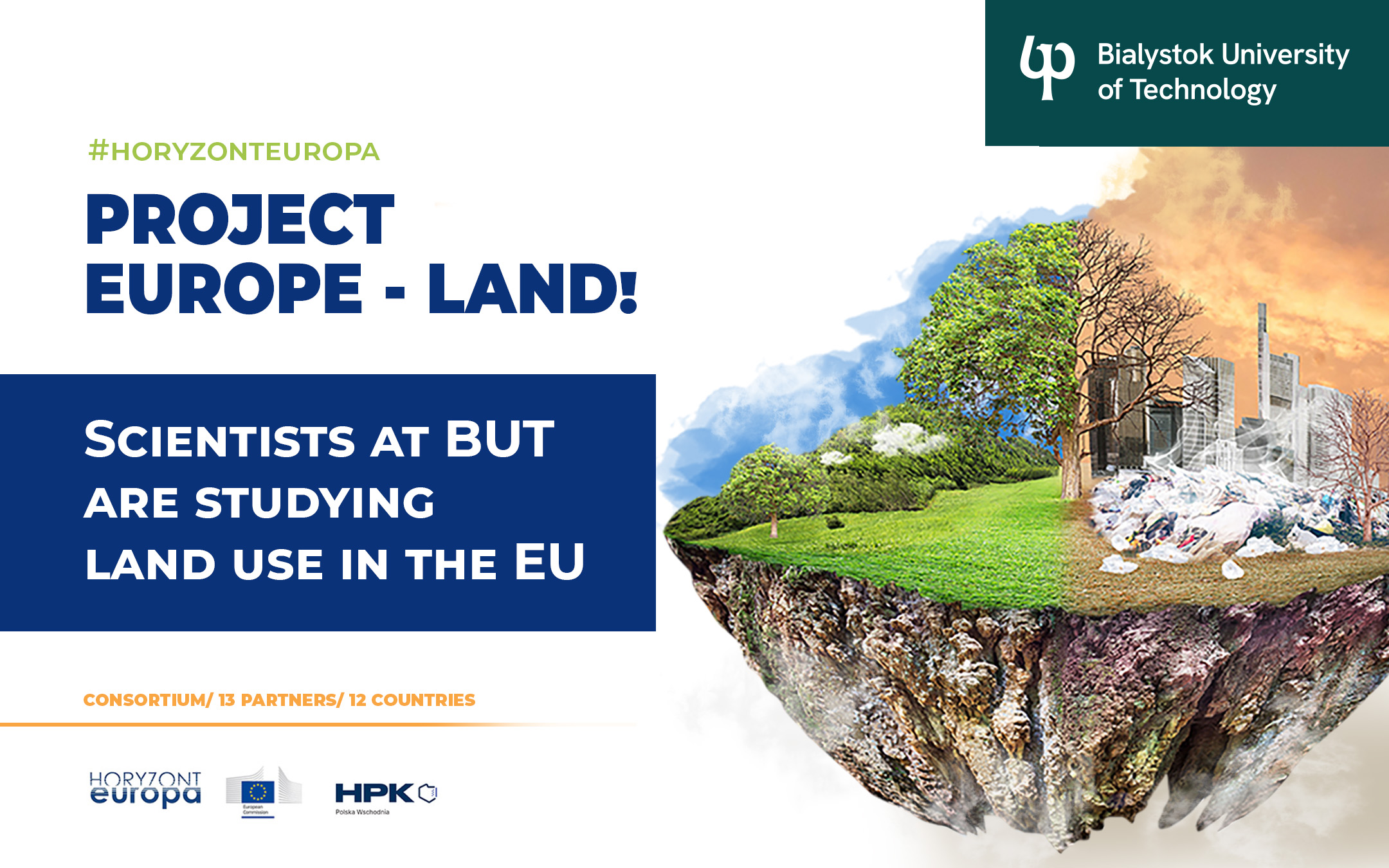Bialystok University of Technology to Research Land Use in the EU within the International Europe-LAND Project
10-07-2024
The initiative has been recognised as significant in the field of European Union research and innovation and has received financial support from the Horizon Europe programme amounting to €6.3 million. The research conducted within the Europe-LAND project will help achieve the UN’s Sustainable Development Goals and improve the EU’s competitiveness. The programme will also facilitate cooperation and strengthen the impact of research and innovation in developing, supporting, and implementing EU policies. The project will be carried out from 2023 to 2027.
The research team from Bialystok University of Technology involved in the Europe-LAND project consists of employees from the Faculty of Civil Engineering and Environmental Sciences and the Faculty of Engineering Management. The project coordinators are Prof. Piotr Banaszuk and Prof. Joanna Ejdys.
– his is a very interesting project, not only because of the relevance of its subject matter, which includes both counteracting and adapting Europeans to climate change. For the researchers and specialists involved, it is a wonderful experience to work in a truly large international team. During the Europe-LAND working meetings, Germans, Austrians, Czechs, Danes, Estonians, Greeks, Portuguese, Romanians, Latvians, Slovaks, Italians, and finally Poles, collaborate, – says Prof. Joanna Ejdys.
The main task of the interdisciplinary consortium implementing the Europe-LAND programme is to identify and understand the factors that determine land use decisions across Europe. By seeking answers to why decision-makers choose certain land use practices, specialists aim to raise awareness and engagement among European stakeholders. They want to demonstrate that these decisions can be more effectively directed towards social benefits, climate challenges, and biodiversity conservation in Europe.
– Land use and greenhouse gas emissions related to the management and use of land resources are today considered some of the key factors in climate change. Particularly the agriculture sector, but also forestry, contribute to about one-fourth of the total global greenhouse gas emissions. As agricultural areas expand, natural habitats are destroyed, and biodiversity loss becomes apparent. In this context, the EU-funded Europe-LAND research project aims to develop more sustainable land use strategies in the face of climate change and biodiversity challenges, – explains Prof. Joanna Ejdys.
By the end of 2024, the Europe-LAND consortium plans to announce the results of the scientific activities conducted so far. These include:
- Collecting the latest data on land use across Europe for a coherent analysis of agricultural land use. The research outcome will be a unique harmonised IACS database for European countries, indicating the main land use trends.
- Developing pan-European methodological frameworks for engaging stakeholders as land use decision-makers. The methodology will eventually show how land resources are used under current and future climate conditions, whose interests are served, and what specific needs and requirements exist for adopting various more sustainable land management practices that support climate change mitigation and adaptation and biodiversity protection.
Future work of the consortium, beyond 2024, will include:
- Analysing carbon-rich wetlands in the EU to identify greenhouse gas emission hotspots at the EU level,
- Evidence-based mapping of future projected land use patterns,
- Developing dedicated telecoupling frameworks enabling future studies and analyses of multilayered connections between social factors and land use changes,
- Creating an interactive tool enabling stakeholders to experiment with different land use forms and understand the hidden links between their choices and possible development trajectories.
A summer school and an open online course on the MOOC platform have also been proposed to support the dissemination of project results and interaction among consortium members. By implementing an open access policy, all stakeholders can join the project’s community of practice and capacity-building activities or access public results at any time.
The Europe-LAND project consortium includes 12 European universities and the FTZ-NK Research and Transfer Centre operating at the Hamburg University of Applied Sciences in Germany:
- Hamburg University of Applied Sciences (Germany) – project leader
- Aristotle University of Thessaloniki (Greece)
- Estonian University of Life Sciences (Estonia)
- University of Copenhagen (Denmark)
- University of Coimbra (Portugal)
- Bialystok University of Technology (Poland)
- University of Bologna (Italy)
- Romanian Academy (Romania)
- University of Latvia (Latvia)
- Slovak University of Agriculture in Nitra (Slovakia)
- University of Natural Resources and Life Sciences, Vienna (Austria)
- Leibniz Institute of Agricultural Development in Transition Economies (Germany)
- Charles University Prague (Czech Republic)
The project’s value is €6.8 million, with support for activities assigned to Bialystok University of Technology amounting to €373,000.
Project website: www.europe-land.eu